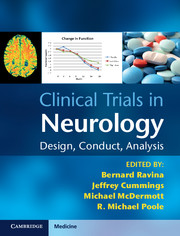Book contents
- Clinical Trials in Neurology
- Clinical Trials in Neurology
- Copyright page
- Dedication
- Contents
- Contributors
- Preface
- Acknowledgements
- 8 Selection and Futility Designs
- 9 Adaptive Design Across Stages of Therapeutic Development
- 10 Crossover Designs
- 11 Two-Period Designs for Evaluation of Disease-Modifying Treatments
- 12 Enrichment Designs
- 13 Non-Inferiority Trials
- 14 Monitoring of Clinical Trials:
- 15 Clinical Approaches to Post-Marketing Drug Safety Assessment
- Index
13 - Non-Inferiority Trials
from Section 3
Published online by Cambridge University Press: 05 May 2012
- Clinical Trials in Neurology
- Clinical Trials in Neurology
- Copyright page
- Dedication
- Contents
- Contributors
- Preface
- Acknowledgements
- 8 Selection and Futility Designs
- 9 Adaptive Design Across Stages of Therapeutic Development
- 10 Crossover Designs
- 11 Two-Period Designs for Evaluation of Disease-Modifying Treatments
- 12 Enrichment Designs
- 13 Non-Inferiority Trials
- 14 Monitoring of Clinical Trials:
- 15 Clinical Approaches to Post-Marketing Drug Safety Assessment
- Index
Summary
Keywords
- Type
- Chapter
- Information
- Clinical Trials in NeurologyDesign, Conduct, Analysis, pp. 135 - 146Publisher: Cambridge University PressPrint publication year: 2012
- 3
- Cited by



